Cotton in Benin, West Africa
With our long-time partner, The Benin Organisation for the Promotion of Organic Farming (OPEPAB), we support over 6,000 farmers in growing organic cotton and have helped these farmers to establish cotton co-operatives and to engage in local and national cotton forums. All organic cotton is sold to the Beninese government with a guaranteed premium (currently 20%).
Of the participating farmers, 30% are women, which is three times the number in conventional cotton farming in the region. Women are supported to develop other means of income. They use donated milling equipment to grind neem seeds to make and sell biopesticides. They also use the mills for grinding maize, which is a time-consuming and laborious job to do by hand. We hope that the time saved will allow girls more time to go to school. Extra income from the mills is paying for extra teachers, increasing the school’s capacity.
We have worked with farmers to develop a food spray, made from local, low-cost ingredients which they can use to encourage beneficial insects into their cotton fields, helping to keep pest numbers in balance and avoiding the use of pesticides.
Our work with cotton farmers in Benin convinced the government to ban the use of the highly hazardous pesticide (HHP), endosulfan.
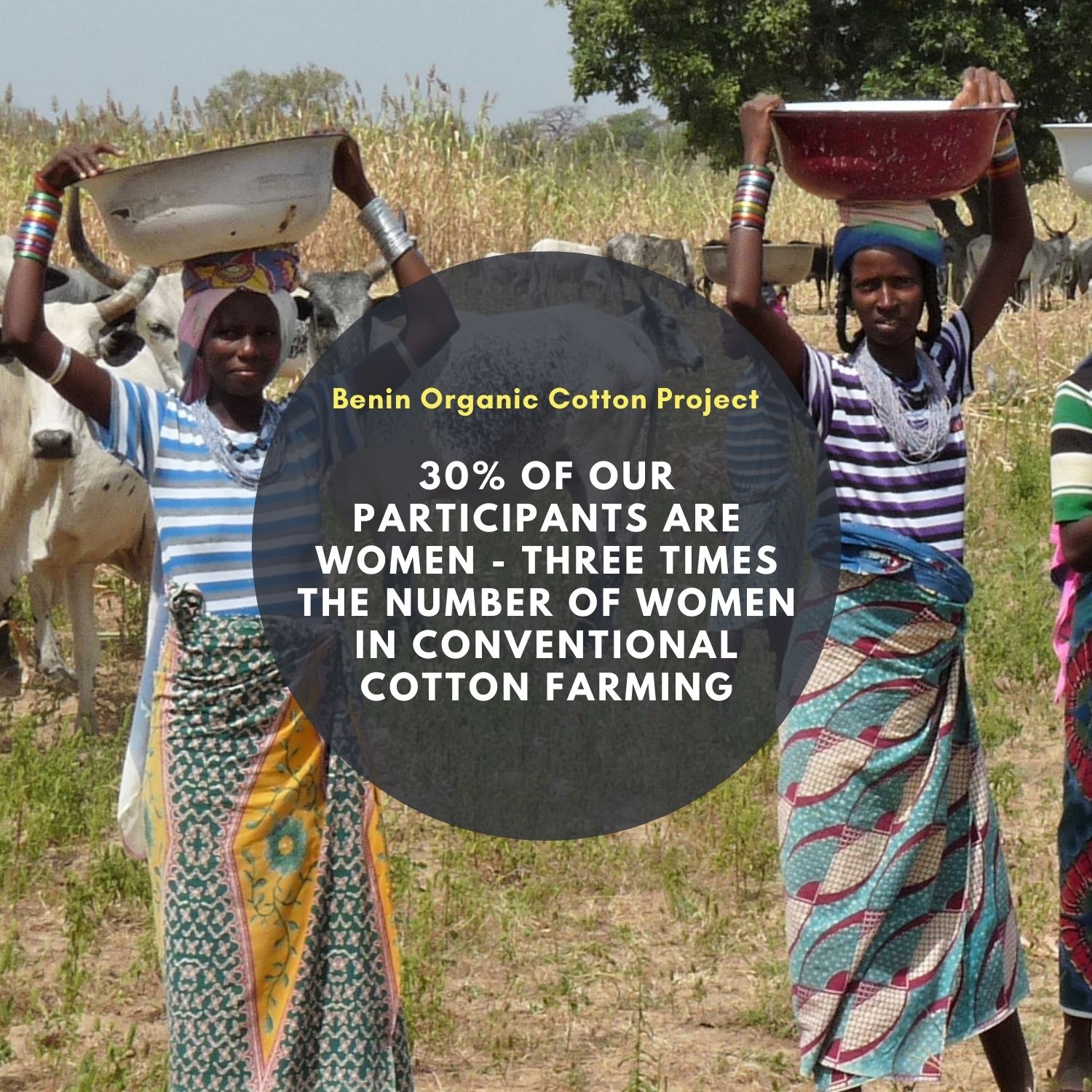
Project update (in numbers): June 2022
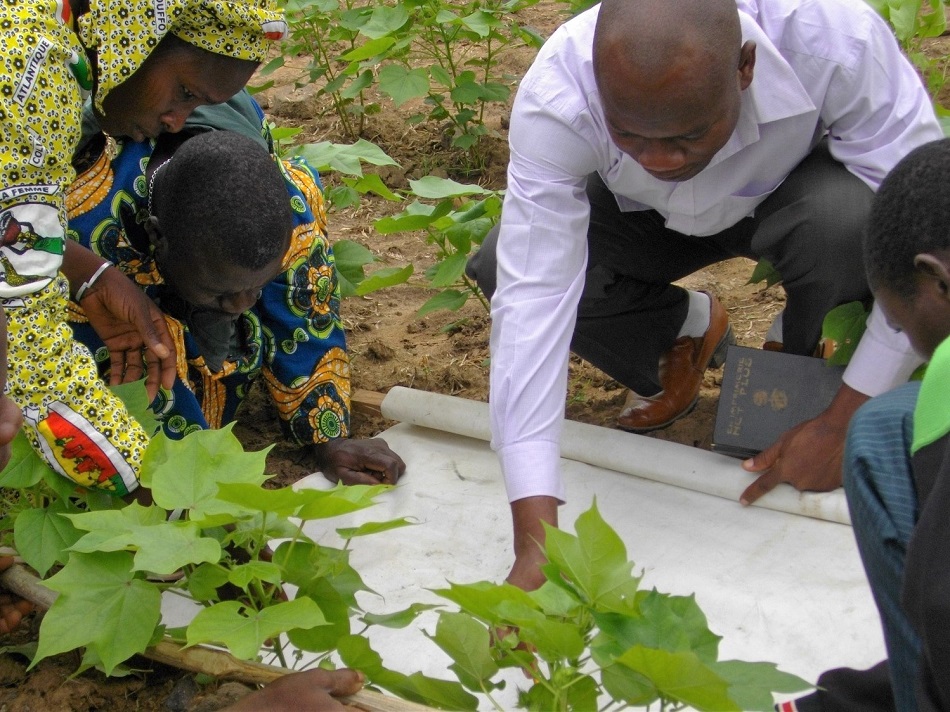
6,205
Farmers trained
The project provides ongoing training, advice and technical support to farmers throughout the year.
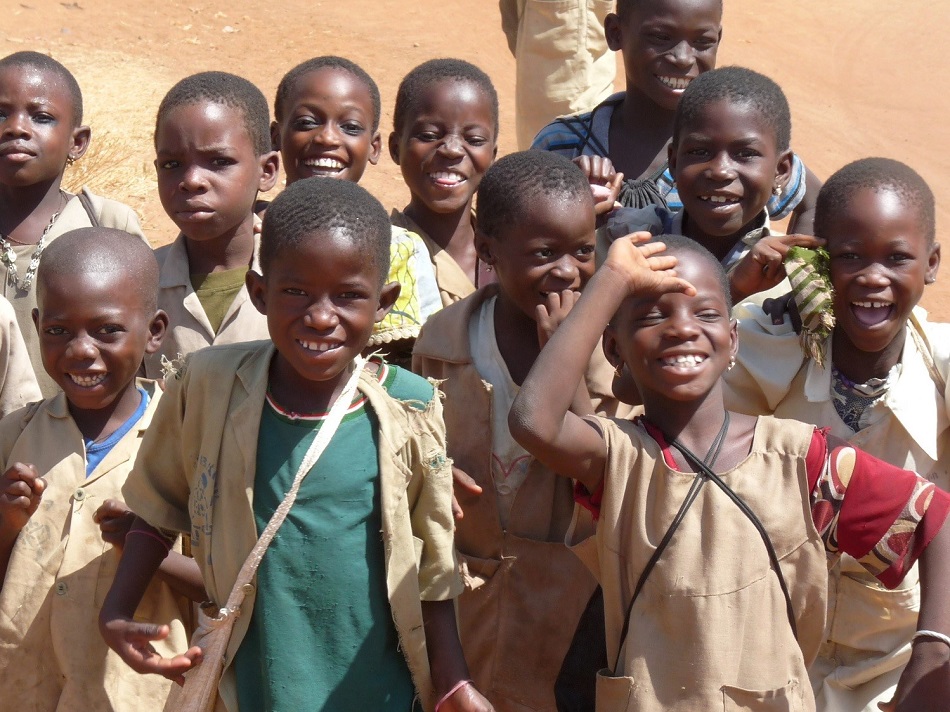
31,025
Safer citizens
Growing organic cotton helps farmers protect family members and the wider community from the harmful effects of pesticides.
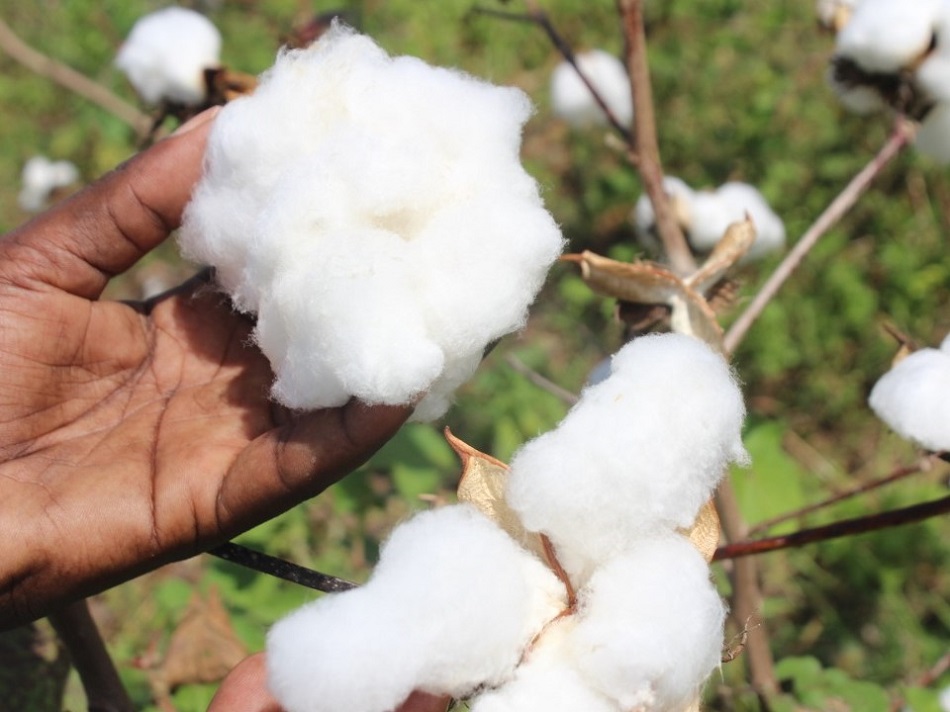
4,475
Certified organic
Recruited farmers achieve the standards required to be certified organic within a few years and are supported by our field team.
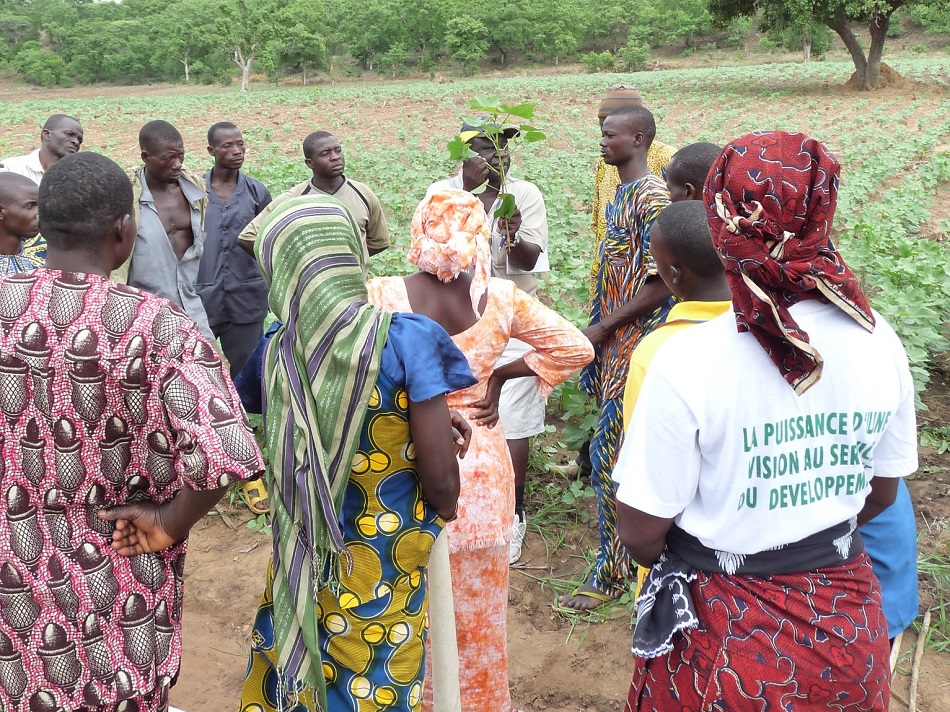
1,809
Female farmers
The proportion of women involved in organic cotton (30%) is three times higher than in conventional cotton. Women also hold positions of responsibility in cooperatives and national networks.
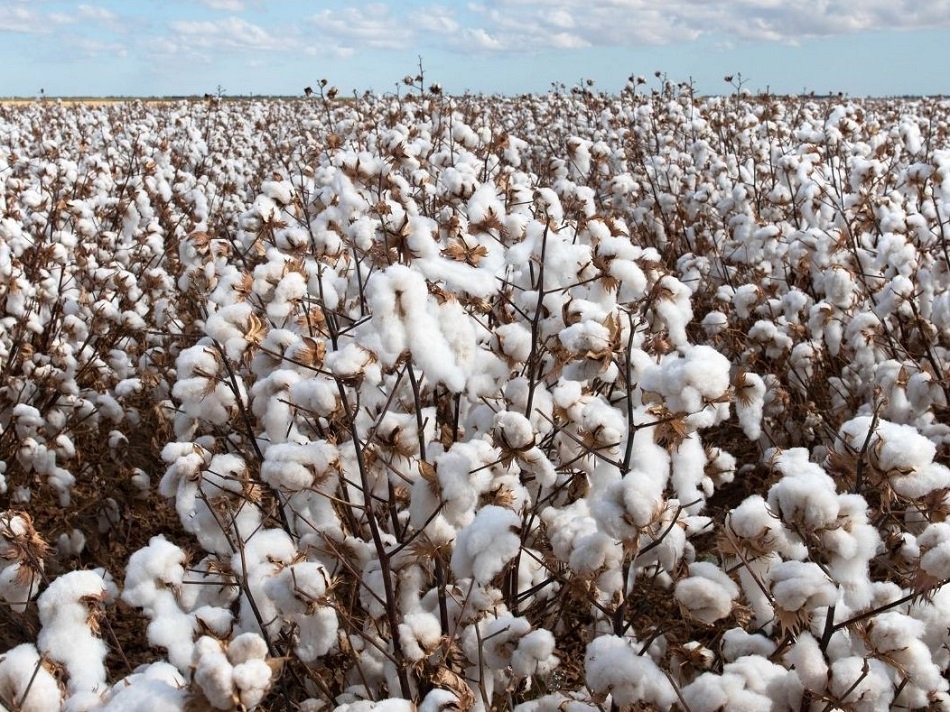
3.2 x
Greater profit
Organic cotton farmers earned more than triple the net income of conventional farmers from their cotton in the last season. They are doing better on non-cotton crops too – profits from soya and maize are up 50% on comparison farmers thanks to reduced production costs.
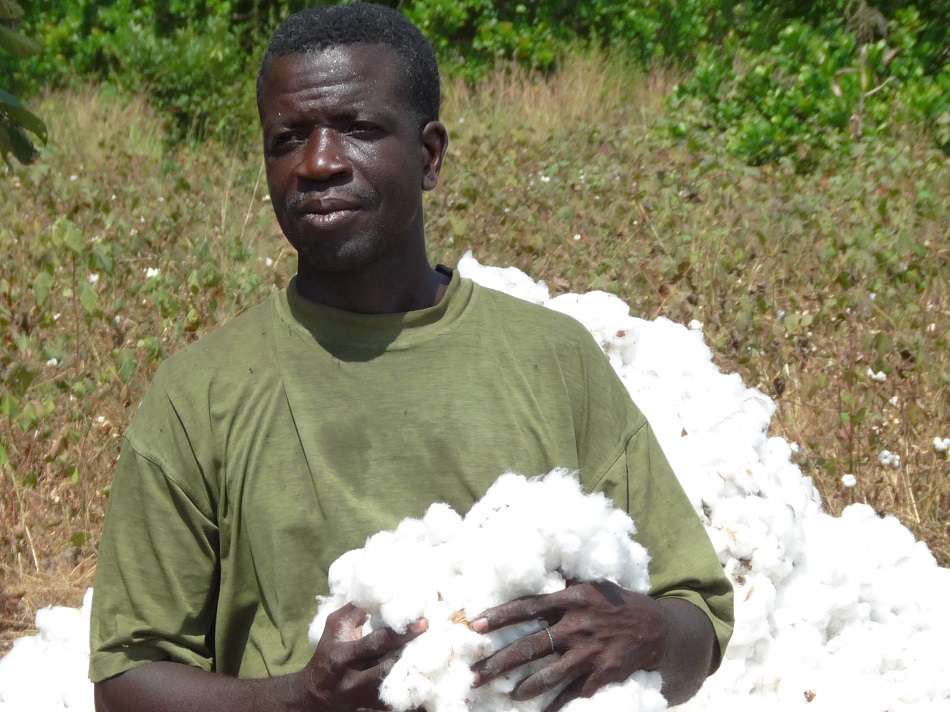
£9.40
Return on investment
For every £1 we spend, farmers directly supported earned £9.40 from increased cotton income alone in 2021. Supported farmers earn more across their smallholding and so the total return is far higher.
Project background
Benin is the fourth largest cotton producer in Africa and cotton supports 50% of its population. Most farmers use unsustainable practices including harmful agrochemicals, leading to widespread pesticide poisoning, loss of ecosystem services and loss of resilience to climate change. Use of agrochemical inputs has risen as farmers try to cope with increasing pest problems and declining soil fertility and can account for up to 60% of production costs in smallholder conventional cotton farming.
In November 2021, PAN UK, in partnership with OPEPAB, Aid by Trade Foundation (AbTF) and Paul Reinhart AG, began a three-year project “Growing Benin’s Organic Cotton Sector” to support smallholder cotton farmers in Benin to convert to organic farming. Overall, the project aims to double the production of high-quality organic cotton in Benin, directly benefiting over 9,000 smallholder farmers, at least 30% of whom will be women and 55% of whom will be 18-35 year olds. The project aims to help farmers achieve a 60% increase in net income, increase the resilience and productivity of their farms, and reduce pesticide harms to biodiversity and human health.
Key activities include Farmer Field Schools (FFS) to train smallholder farmers in sustainable farming methods, field trials to evaluate and adapt improvements in agroecological practices for organic cotton production, and seed trials to ensure that high quality, locally adapted, organic cotton seed is available to all participating growers. The project will also contribute to strengthening the linkage of actors along the supply chain and thus to more transparency and continued high demand for Benin’s organic cotton. In this way, continuous investments will be sought to ensure the future of smallholder organic cotton production in Benin.
Phasing out Highly Hazardous Pesticides (HHPs)
Many pesticides used in cotton farming are highly hazardous in nature. Farmers are rarely provided with proper training in pesticide use and very few farmers ever wear any form of personal protective equipment. Episodes of sickness after each round of spraying are common. Farmers are spending, on average, 10% of their cotton income on medical treatment for health issues related to pesticides. Research by OBEPAB and PAN UK revealed that exposure via contaminated food, water and re-use of empty pesticide containers also forms a major exposure route for farming families and was responsible for numerous fatalities.
OBEPAB’s painstaking documentation of acute poisoning incidents in the country’s cotton zones, and their identification of endosulfan as the most frequent culprit, was influential in persuading the government to announce a national endosulfan ban in 2008.
Improving health
Surveys conducted in Benin between 2016 and 2022 have consistently revealed that a staggering 60-80% of conventional farmers experience symptoms of acute pesticide poisoning each year and more than half lost days off work as a result. Disturbingly, in our latest study, we found 29% of conventional farmers experienced symptoms of pesticide poisoning 5 or more times in the previous year. Farmers frequently report skin and eye irritations and headaches, but a high proportion of farmers experience serious systemic reactions such as blurred vision (51%), tremors (34%), memory loss (3%) and convulsions (2%).
Children are much more vulnerable to the impact of pesticides due to their smaller body mass and lowered ability to process toxins. Children are often involved in the pesticide application process and are also at risk, along with their parents, when empty pesticide containers are used for storing drinking water and foodstuffs. Results of the survey showed that 48% of farmers had spent an average of £28 over the year on medication for pesticide-related illness – a significant amount when most farmers earn less than £300 per year from cotton.
Protecting the environment
Farmers often regard all insects in their fields as pests that need to be controlled with insecticides. The reality is that a large proportion of these insects are beneficial to the farmer, preying on pests and helping to control their numbers. Even insects that are deemed to be pests often only cause damage when found in large numbers. In addition, increased use of fertilisers and pesticides are thought to be two of the major factors accelerating the loss of soil biodiversity.
In this project, smallholder cotton farmers are being trained by OBEPAB staff in organic, agroecological and Integrated Pest Management (IPM) principles and practices as part of the Farmer Field School approach. Using cheap and locally available ingredients to make a yeast and sugar-based food spray that enhances the populations of beneficial insects, ‘farmers friends’, in cotton fields is one such practice.
Farmers are also given training in soil conservation techniques and use of organic manures, composts and oil palm cake to improve soil structure and fertility. Healthy soil contains billions of microbes that break down organic matter (as well as help soil resist erosion, cycle nutrients, and store water). One of the main outcomes of the project is that organic cotton farms have healthier soils. Our objective is to measure the benefits of organic farming on soil health by measuring soil organic matter/carbon content and the rate of cotton cloth decomposition. It is expected that the more active microorganisms live in the soil, the faster and the more holistically the cotton cloth will be eaten up.
Improving livelihoods
Training through our Farmer Field Schools on organic pest management techniques reduces input costs by over two-thirds with no yield detriment. Organic cotton systems are based on crop rotations and intercropping. Our project is currently testing ways of adding value and extra income to farmers’ chosen cotton companion crops, such as cashew and shea. All organic cotton is sold to the Beninese government with a guaranteed premium (currently 20%). With lower input costs and higher revenue, organic farmers earn significantly higher profits on their cotton crop, typically double or triple that of conventional farmers. Farmers also benefit from reducing input costs by half without reducing yields on other crops such as soya and maize and, increasingly, from premium prices for certified organic soya.
Empowering women and children
Neem seeds provide the basis for an organic pesticide, but they take a long time to grind by hand – a task often performed by women in cotton-growing communities. Women are taking an increasingly active role in their cotton farming communities and mills have been provided by the project to drastically cut down the amount of time women and young girls spend on farm labour. The mills are managed by women’s groups. They grind and sell the neem, as well as other foodstuffs for the community members, at a small fee. The profits contribute to village development projects, decided by the village committee.
One village, for example, is using the extra profits to finance four more teachers for the locally understaffed school. The decreased time spent on farm labour, as well as the extra teachers, is allowing more children, especially girls, to attend school. Our projects are designed to include women in the core agronomic trainings and we provide other forms of tailored support, such as training in functional literacy and cooperative management, to unlock their potential as farmers and drivers of community development. Where we work, we see that women are taking active leadership roles in farmers’ co-operatives and in decision-making within their communities.
This project is supported by TRAID, Aid by Trade Foundation, Paul Reinhart AG, and the Global Project “Sustainability and Value Added in Agricultural Supply Chains” (GP AgriChains) of Deutsche Gesellschaft für Internationale Zusammenarbeit (GIZ) GmbH on behalf of the German Federal Ministry for Economic Cooperation and Development (BMZ).
